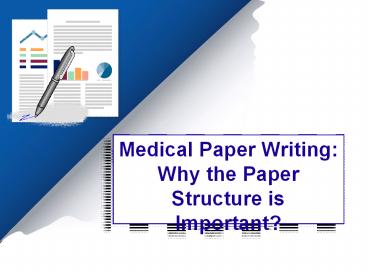Medical Paper Writing Service - PowerPoint PPT Presentation
Title:
Medical Paper Writing Service
Description:
Medical Paper Writing: Why the Paper Structure is Important? – PowerPoint PPT presentation
Number of Views:64
Title: Medical Paper Writing Service
1
Medical Paper Writing Why the Paper Structure is
Important?
2
Medical Research Paper Writing
- The purpose of writing a medical research
paper is not only to tell the world about your
research. It is to go beyond the mere
presentation of facts and thoughts. You must
reach out to the readers in a way that
communicates your research effectively and helps
them understand the issues at hand. - Theres no point in writing a research paper if
the readers cant take away the most important
message or the message you want to convey through
your medical paper.
3
Why have Good Manuscript Structures?
4
Medical Paper Writing The Essential Elements of
its Structure
5
- Introduction
- (What are you studying and why)
This section to let the readers understand why
you undertook a particular study.
6
DOs and DONTs
- Use a simple and layman language which the
readers can understand. - There must be a logical reason for undertaking
your study. State this reason by providing a
background of the problem you aim to resolve
through research. Cite the studies to support
your arguments. - Summarize the current knowledge on the topic,
citing appropriate studies.
7
- Explain how your research will contribute to the
field or advance the current knowledge. - State the research question clearly.
- Explain the theory behind your research study.
- Dont review all the published studies on the
topic. Only cite the relevant ones.
8
2) Methods (What and how did you do)
This section describes the methods of experiment
you followed to arrive at your conclusion.
However, a well-conducted research is always
replicable. This means that another researcher
can reproduce the results by following the
methods described in your medical paper.
9
DOs and DONTs
- Write full details of all the methods,
techniques, instruments, and the lab settings. - Give a diagram of the experimental setup.
- Specify the questionnaire, survey, or other data
collection instruments - Cite the studies that support the validity and
reliability of the used methods and instruments. - Explain the analysis methods and why you chose
them - Dont exclude any important detail to just avoid
writing a lengthy description of methods.
10
3) Results (What did you find)
It includes the outcome of your study. Start with
the most significant findings first followed by
the less important ones.
11
DOs and DONTs
- Describe the actual findings rather than
generalizations. - Use tables and figures where necessary
- Describe any unexpected or surprising results in
the text - Give an easy and comprehensible interpretation of
the results rather than simply stating the
statistical data - Dont include detailed descriptions of the
results illustrated by figures and tables
12
4) Discussion (Meaning of your findings)
A good discussion describes each of the findings
with their broader implications, and how they can
be generalized to derive a conclusion stated in
the introduction.
13
DOs and DONTs
- State whether your hypothesis was supported by
any references - Explain what the results imply
- Relate your findings to the previous studies in
the domain whether your findings support or
contradict the previous studies
14
- Explain how your study adds to what is already
known. - If there are any alternative explanations for the
results, mention them. - Brief about the limitations of the study, if any
- Dont simply repeat the results
- Dont draw any conclusion that is not supported
by the data
15
5) Conclusion (What you learn from the study)
Finally, state the main conclusions of your
study. The readers must be able to understand
what you did, how you did, and how you arrived at
your conclusion.
16
DOs and DONTs
- Explain what youve learned from the study. The
conclusion must be directly related to the
research question posed in the Introduction. - Explain the broader implications of your
research. - Suggest future avenues of research to advance the
knowledge gained from the study or answer
questions your study could not address. - Dont write any conclusion that the research
doesnt really support.
17
- A good writer keeps his audience and their
variety in mind while writing his paper. - He structures it so that the readers know what to
expect under different sections of the medical
manuscript.
18
(No Transcript)
19
- Email ID project_at_cognibrain.com
- Phone 044-49595223
- Visit us https//www.cognibrain.com/































